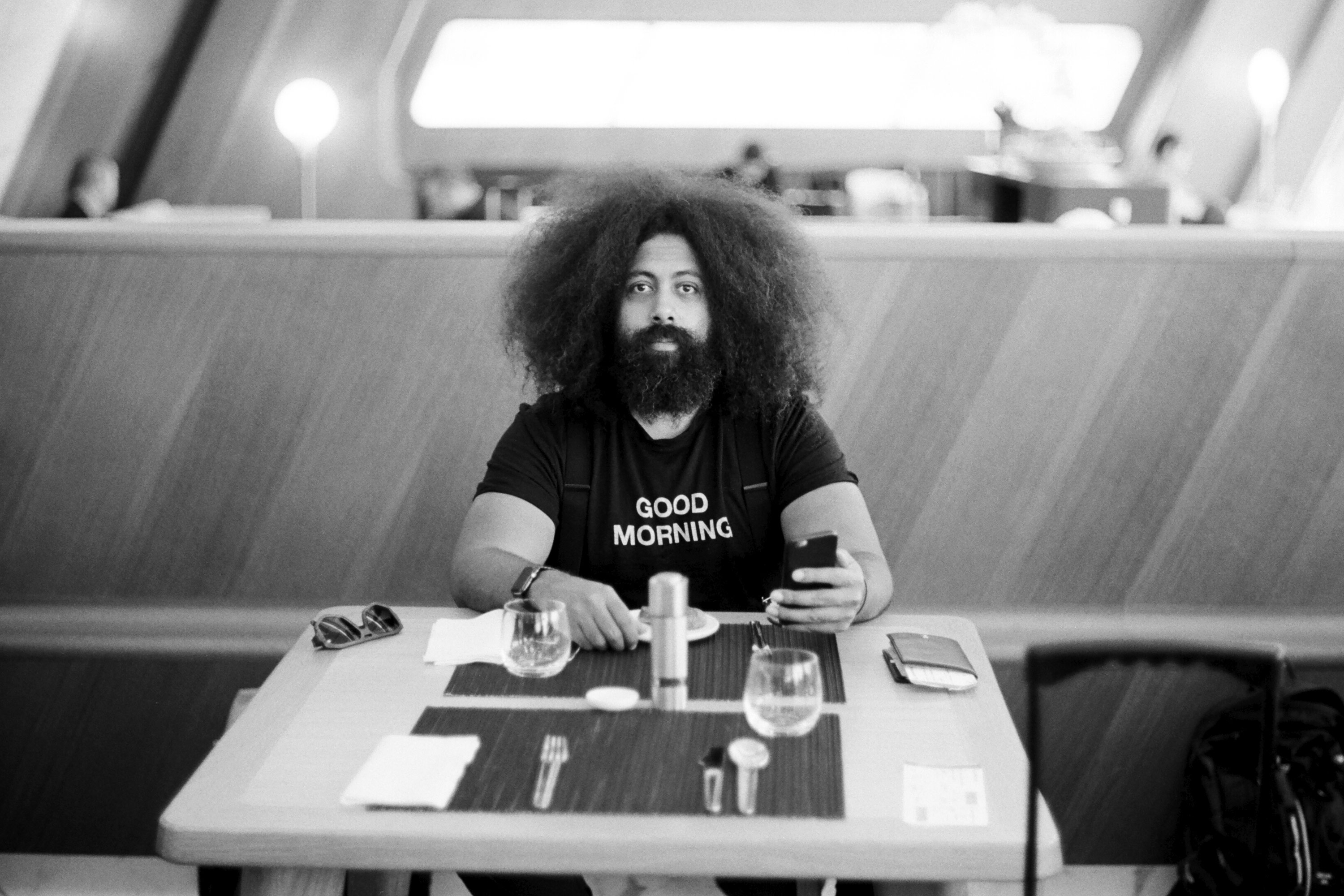
- Interview by Tina Essmaker December 6, 2016
- Photography by Megan McIsaac
Reggie Watts
- actor
- comedian
- musician
Interested in performing from childhood, Reggie Watts is known for his entirely improvised sets, but improvisation has played a role in his path, too. Here, the entertainer talks about how exploration and play have shaped his mostly unplanned career, his goal to create work that helps people recontextualize their experiences, the role of art and community in our current political landscape, and his new Netflix special, Spatial, out today.
I had a chance to preview your Netflix special, Spatial, and it was great. The entire performance is improvised. Tell me more about it. It’s an idea I had a long time ago to do a theater-style standup special and create some cool moments. I described the general idea to Netflix, which was that I wanted it to be theatrical and take place in real time in front of a studio audience, with some crazy bits mixed in. They were pretty trusting. It was cool.
What happens for you onstage when you’re improvising a performance? Well, I create a framework of things that will happen and make sure that all of the technical elements are functioning. Then I show up and hope it all works out. When they tell me it’s time to start, I start.
Improvisation is what I’ve always done, so I don’t know another way. It’s the way that makes me feel the most comfortable. Each time I perform and people have an okay time at my show, it’s a reinforcement of my technique, I guess.
How old were you when you first had the inclination to perform? I was interested in performing from the time I was a little kid. I can’t remember a time that I didn’t want to make people laugh or elicit some kind of response. I think I was weirdly born a performer.
So your first audience was your family, then. Is anyone in your family creative? No one in my family is an artist. It seems to come out of nowhere. At a certain point, I thought I might want to be an aeronautical engineer, but I just liked airplanes when I was in elementary school. Art came to me pretty quickly after that, so I knew I would do something creative.
I was steeped in creative things and the arts were seen as something good to do in school. I took classical piano at age 5 and then I took violin lessons and played in the school orchestra. I also loved stories and culture and movies. For me, it was mostly about having fun, being imaginative with other people, and feeling part of something creative, whether that was playing Star Wars with my friends in the backyard or trying to replicate special effects. It was always about experimenting and creating new worlds.
My career path wasn’t something I thought about too hard, other than, oh, I should move to Seattle because there’s a music scene there. I figured I could play music, even though I remember my mom told me I’d have to get a real job. But then I went there, played in tons of bands, made money as a musician, and only had to take a few regular jobs. It was mostly a choice to put myself in situations where a career could happen, but I never said I wanted to have a career in this or that.
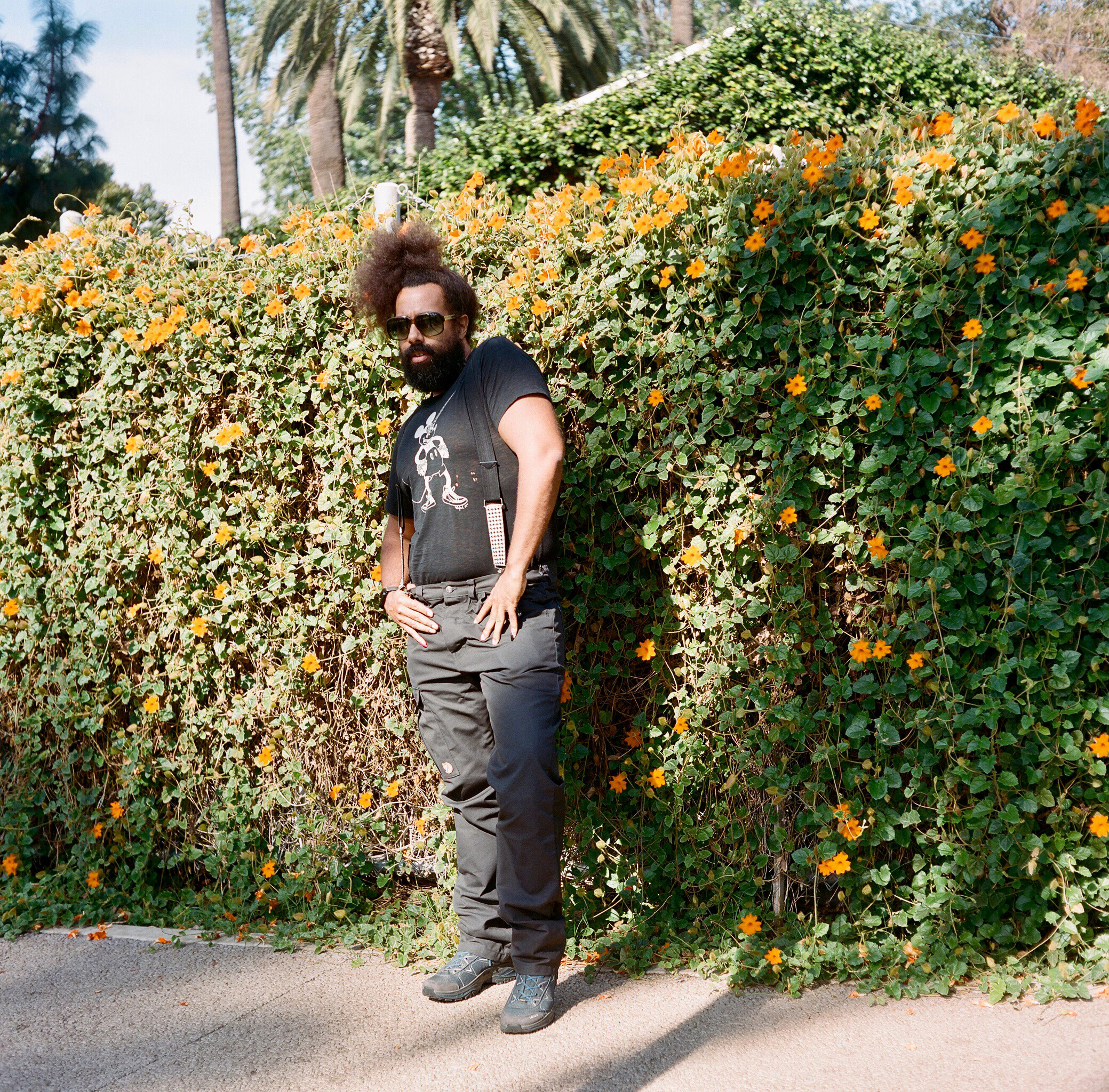
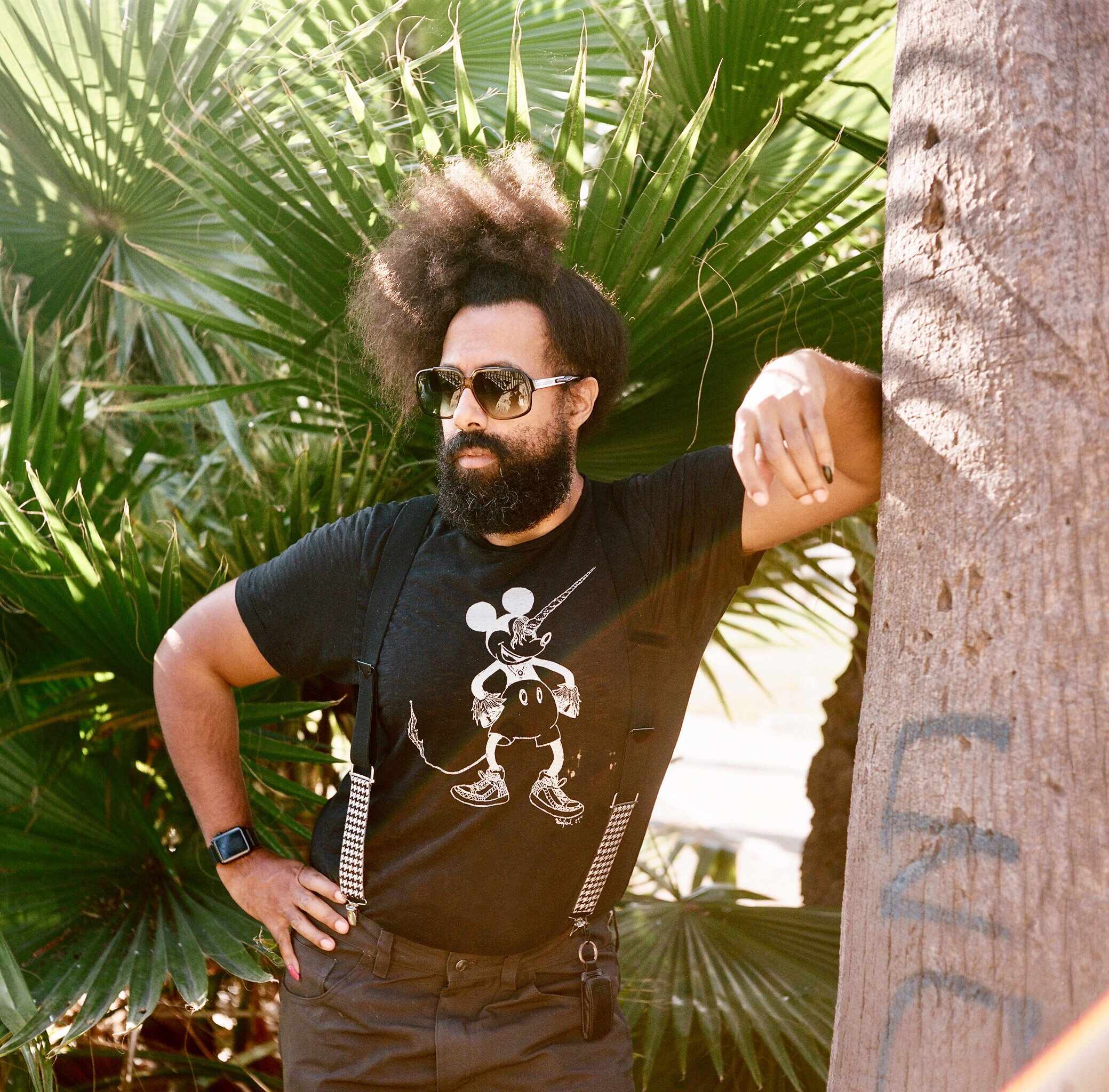
You moved to Seattle after high school, right? Exactly. I moved there in 1990 and briefly went to Art Institute of Seattle, but I couldn’t stick with it. I met a few musicians who lived together and I started to jam with them and dropped out of school and pursued music. I ended up living in Seattle for 13 years.
And then you decided to move to New York to explore comedy. What led you to decide to move and switch your focus when music was going well for you, and was that a risk? Certainly. There’s always a risk, but it was more exciting than daunting. I had also done comedy in high school and had done improvised solo comedy, so I had that in my background. It wasn’t a cold move into something completely new.
I worked with a band in New York and they had me come out to write music with them. While I was out there I started to do standup at a place called Rififi on a night called Invite Them Up, which was started by Eugene Mirman and Bobby Tisdale. Everybody performed there and I met a lot of people. When I performed there, it immediately felt like my family. I knew that if I moved, I had friends and a place to perform and it would all work out.
So it wasn’t completely unknown to you. No, not at all. And my playwright friend who lived in the Lower East Side had a room open up in his apartment, so that was a sign for me.
That’s awesome. So, as you were performing and doing comedy, how did your style develop? Was there ever a conscious effort to find and develop your voice? To an extent. There were things I loved to do and basic skills I’ve employed to make sure that me being on stage isn’t a total waste of time for people watching. Technique can be part of voice and, for me, it was about getting more comfortable on stage so I could expand my ideas. A lot of that came from performing over and over again as much as I could. I learned from that, and doing experimental theater helped as well.
That’s a good point. Finding your voice often happens though experimenting and enough repetition to figure out what resonates and feels good to you. Then you iterate. It’s a process. You just gotta do it. As an improviser, it’s a little easier. I can say that, and it’s actually true. But it’s different if you’re writing and developing material.
True, but maybe what we look for is to feel safe or to hope there are certain steps we can take to be confident. There’s no safe way of doing it. You just have to act and be fearless about shit.
“…my main goal is to create work that helps people think of things differently and understand that there are other ways of thinking about the same thing. There’s more than one way to observe or come to a conclusion.”
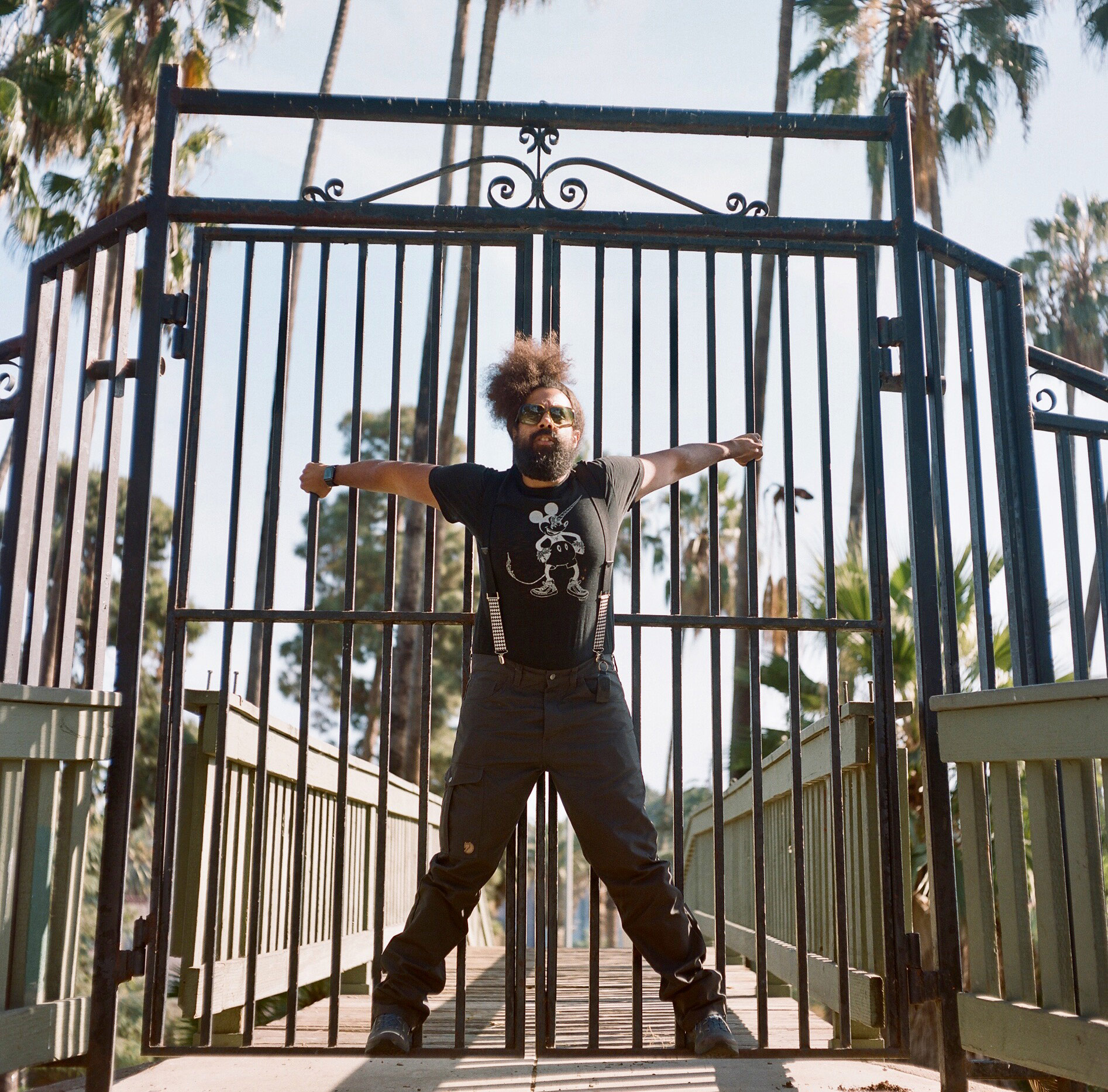
How long did it take for you to feel confident on stage? I always felt a pretty good amount of confidence. I was more nervous if I played a piece on the piano for a recital because it was already written. If it was me making up stuff, I felt pretty comfortable because I was in control and didn’t have to memorize anything. It was easier to be comfortable.
That makes sense. So, last year you joined The Late Late Show with James Corden as band leader and moved from New York to LA. How has that influenced your creative output? Yes, I moved to LA for the show. I don’t perform live here as much as I did in New York, but, creatively, I’m still putting out a lot. I could definitely put out more, but it’s been pretty on par with what I was doing in New York.
With all of the work you’re doing now, do you feel creatively satisfied? For the most part. I think I could do more things that would make me satisfied, but I’m working on it. I want to make more videos and shows that seem scripted, but aren’t. I’m building up the video and filmmaking elements of my creative endeavors and I’m getting better at production by practicing. I’m getting there. When the special comes out, I think that’ll give me an advantage and hopefully give me momentum to make the next thing.
Do you feel a responsibility or desire to contribute to something bigger than yourself? Yeah, everything I do is working towards that. For me, it’s about increasing my platform so that I can create whatever I want to create, in any medium at any given point. Through that, I can do commentary on all kinds of things that are happening.
In thinking about how I can help society at large, my main goal is to create work that helps people think of things differently and understand that there are other ways of thinking about the same thing. There’s more than one way to observe or come to a conclusion. I think of it similarly to what Monty Python did—people watched their shows and they were absurd, but they also made political commentary without necessarily being political. I’m not interested in politics. It’s more important to me to instill critical thinking and self-education in people so they can at least have conversations with others who hold different views. (laughing)
I agree. Art helps us let our guards down and think differently about the world through something we experience, whether it’s music or art or a performance piece. That’s really powerful. Yeah, it’s like I always say, when in doubt, zoom out. You need tools to help you see the context of your situation so you can be less reactive and more strategic in creating long-terms solutions as opposed to reactive short-term solutions.
That’s what I like to do—show the commonalities of our lives. Everyone laughs together, and everyone sees when things are absurd. If someone says they’re pro-life and someone else says they’re pro-choice, it’s like, I get what you’re saying, but what do you guys really want? Obviously, one stance seems more pragmatic or rational than the other, but it’s about getting to the core. I think of it likes branches—they all come from the same place before they branch apart. We have to find a way to address the core before it splits. That’s the most effective way to create solutions between people.
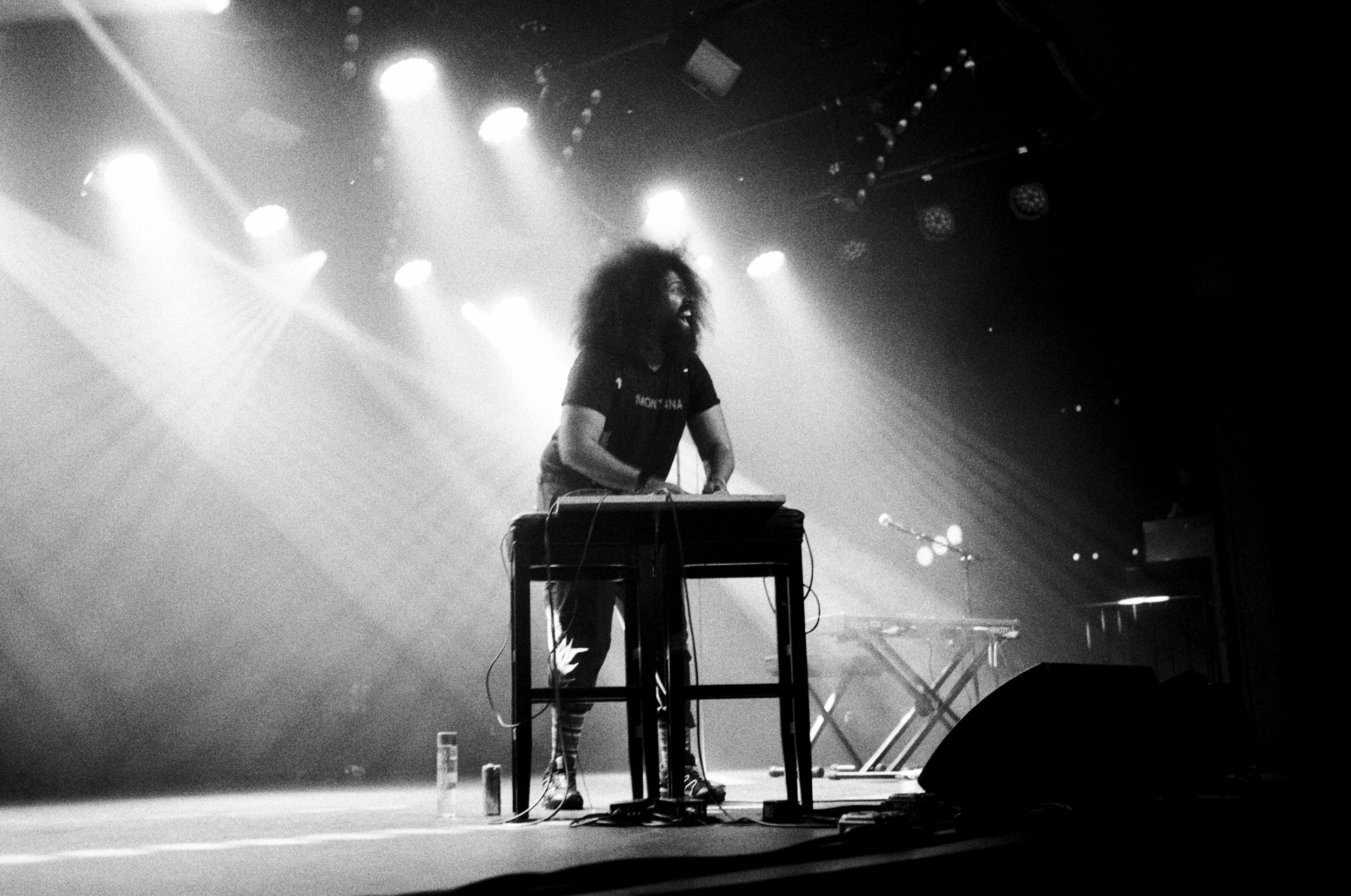
“Art motivates people and makes them aware of things on an emotional level. It’s a form of energy. It’s fuel. It can be good for escapism, but it can also recontextualize things.”
Yeah, that’s been on my mind this last week since the election. Many of us are anxious and worried about what the future holds for us under a Trump presidency. After the election, I saw that you tweeted, “Playtime is over now it’s time to crank up love and empathy to 110% and make some incredible fearless art. This is a direct order.” What’s the role of art during a time like this? It’s an opportunity to engage in whatever way you feel motivated to engage. Some people aren’t the best speakers, but they can create an amazing dance piece that elicits emotion. When a large audience of people who are frustrated see that, it might break through on an emotional level and allow them to feel a release of anxiety and tension. That’s super important.
Art motivates people and makes them aware of things on an emotional level. It’s a form of energy. It’s fuel. It can be good for escapism, but it can also recontextualize things. It creates reactions and stirs the pot, not allowing stagnation to take over. It refreshes the context. There were people who responded to my tweet to say that art doesn’t do anything. My response is, are you aware that it’s the cause of everything we feel?
All of this divisiveness is created on purpose by people, not in a conspiratorial way, but an opportunistic way. When people in power see fissures, they add more fuel to the fire to increase division. I don’t think they ultimately care about policy. They care about stimulating markets to make money. They want power, leverage, control, and money. It’s an instinct—a predatory instinct—to see weakness and take advantage of it.
I think art is dangerous to people like that because it gives us critical thinking skills. Often, people who we think are against things—or who believe differently than us—just want their opinion to be heard. They want some respect. We all think our way is better sometimes, and it’s about instilling the fact that we can all have different points of view, but most of us want this country to be a cool place. There are many similarities beyond our differences.
Yes, and art is one way to break into that conversation and ask questions without assuming or judging. That’s exactly it. That’s why art is so great.
So you’re not a skeptic. You do believe that art still stands and that it can speak to where we’re at now and engage us in hope. Always. Of course. All forms of art help. Art and science are the only things that truly matter in human society. Everything else is a complexity based on how we decide to organize systems to keep civility.
I believe in self-reliance, distributed intelligence, and collective individualism. The shortage of resources, or this fear we have of losing our resources, is solvable on a community level. People can take care of problems in their own communities and not wait for the police or governments to solve them, within reason. These solutions exist right now, whether that’s community gardens that we plant together for food or off-the-grid power we generate and use.
There are so many things we can do ourselves. I think we fixate too much on the systems and whether we’re for or against them. The systems are there, but as more of a safety net to protect people’s rights. But, really, day to day life is pretty solvable by increasing dialogue with our community and being thoughtful about the people around us.
“There are so many things we can do ourselves. I think we fixate too much on the systems and whether we’re for or against them. The systems are there, but as more of a safety net to protect people’s rights. But, really, day to day life is pretty solvable by increasing dialogue with our community and being thoughtful about the people around us.”
Of course our systems could be better, but when we blame them it removes responsibility from us and then we don’t have to do the work in our daily lives. Definitely. That’s the problem, and people love talking about problems. People talk about the possibility of the ACLU or Planned Parenthood losing funding, but they won’t lose funding. If the government decides not to fund them, then we’ll fucking crowdsource the money. I mean, people raise millions of dollars for a belt clip. It’s not that hard to finance a year’s budget for Planned Parenthood using crowdsourcing.
For sure. Part of what’s happening in the wake of the election is that people are realizing the power they have in their daily lives to support what matters to them. Totally. It’s amazing. I think people need to create apps now that increase community connection. You have Slack for the workplace. We need a Slack for the neighborhood. That and an app to redistribute all of the things we have in our homes. We have so much shit we’d like to get rid of, but don’t know how to, so we hold onto it or throw it out. There needs to be a service to declutter your house and distribute the items to people who need them. It’s easier to let go of things when we know they’re going to someone who’s going to use it. That’s how I feel. We can create systems using the technology we have to solve so many problems.
For sure. I wanna shift and go back to this theme of improvisation, which is at the heart of your work. We were just talking about this on some level—that as humans we like to plan and organize because we like to feel safe, but aren’t we all just improvising? We are. I say that all of the time. Everyone is constantly improvising on some scale. People think that having structure means you’re not improvising, but you definitely are.
You can’t structure your life enough to remove the need to think critically, make choices, and improvise. What do you think improvisation can teach us about ourselves? It shows us that we can adapt to situations in real time. Knowing that helps with our general outlook. It gives us flexibility. Improvisation allows us to be more flexible in our minds and not be so binary or defeatist when something is outside of our comfort zone. Instead of saying we can’t do something, we start to believe that we can.
I like that. Alright, I have one more thing to ask. On The Late Late Show, you get to ask guests a question. You make those up on the spot and they’re weird. You get all kinds of reactions. Depending on what I’m asking, people sometimes get lost in the asking of the question and respond by brushing it off. The reactions are varied, but it’s nice when people play along. My questions are crazy, so I don’t expect everyone to answer.
Would you like to pose a crazy question to our readers? If you were a frog, what kind of a cake would you make? (laughing)
Alright, we’ll see if you get some answers to that on Twitter.
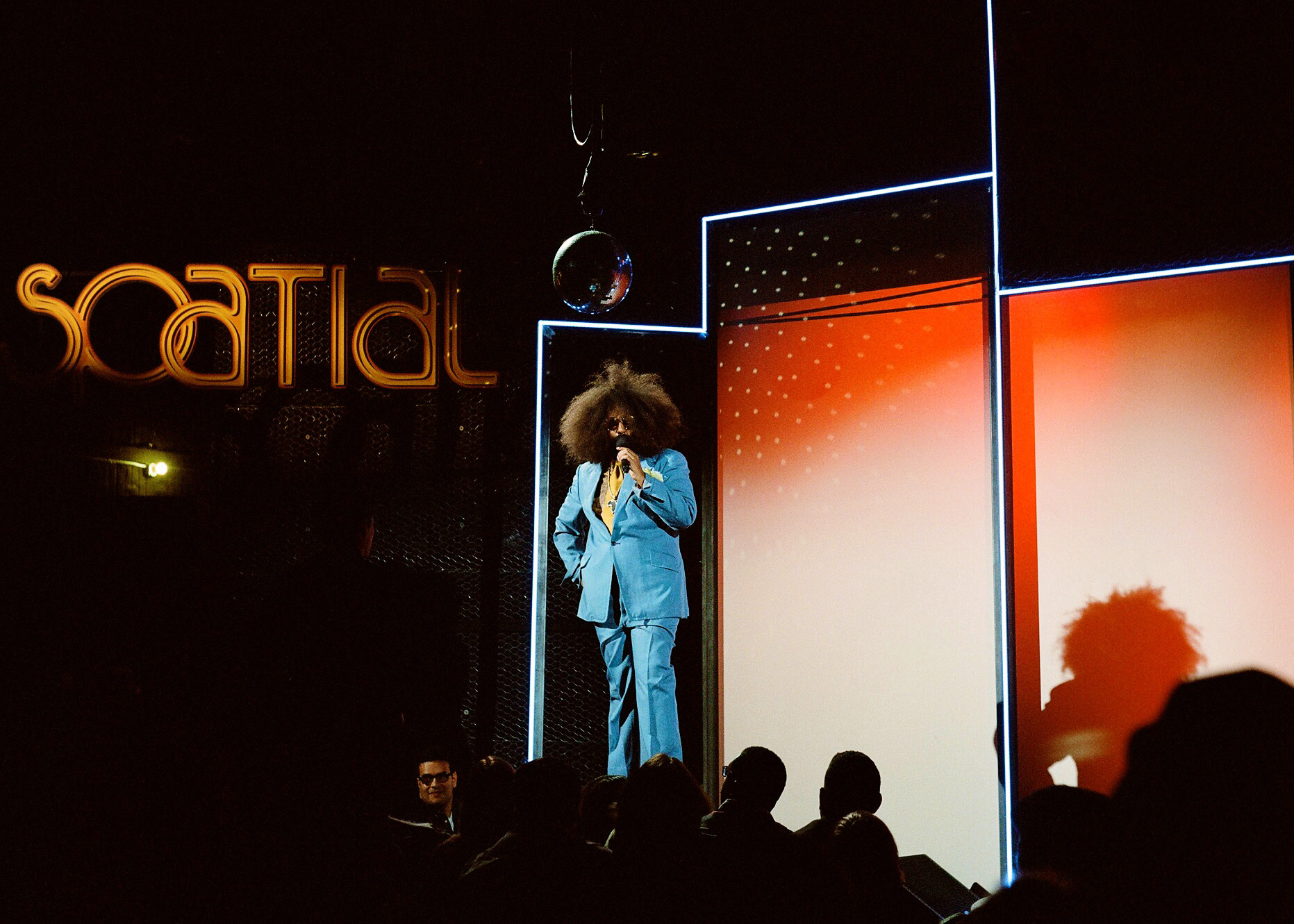
“Improvisation allows us to be more flexible in our minds and not be so binary or defeatist when something is outside of our comfort zone. Instead of saying we can’t do something, we start to believe that we can.”